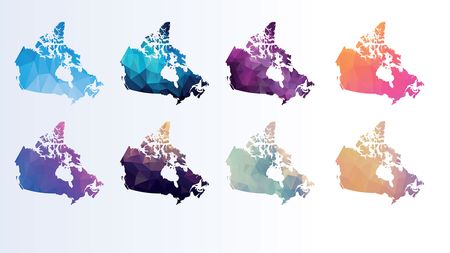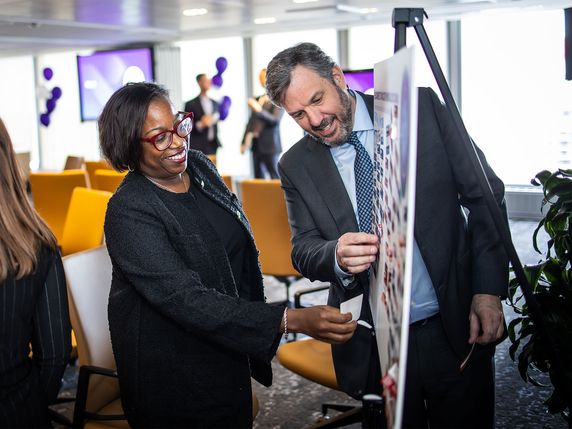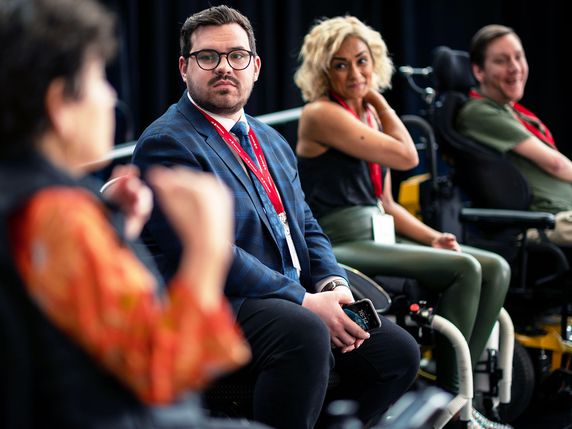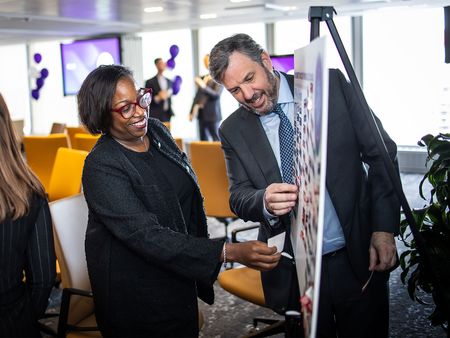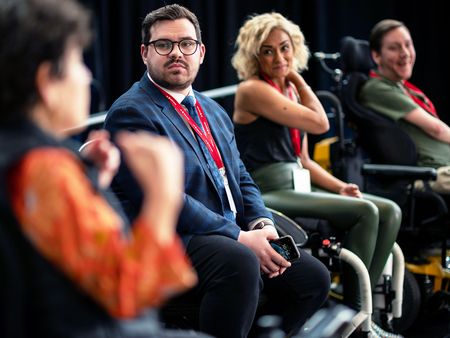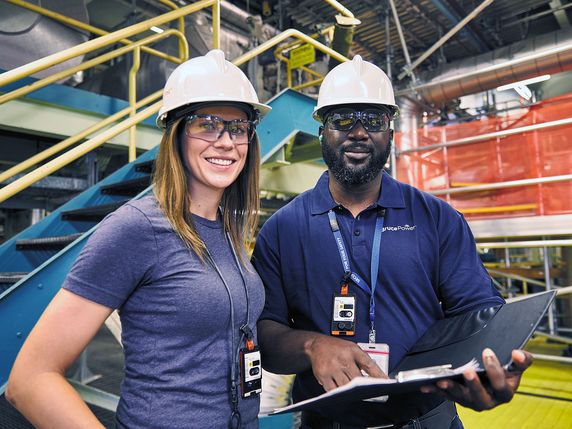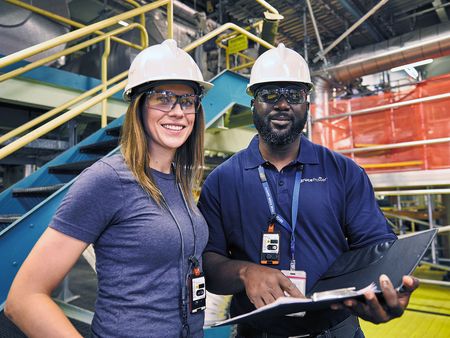Introduction
"Do the best you can until you know better. Then when you know better, do better." - Maya Angelou
Those words could easily be applied to the evolution of diversity, equity, and inclusion (DEI) in the Canadian workplace. It wasn't that long ago that the C-suite was an all-boys club and only new moms got parental leave. As we celebrate Canada's Best Diversity Employers (2024), it's interesting to see how far we've come and where we still need to go.
For many of this year's winning organizations, DEI been a journey over decades with increasingly progressive initiatives, including accountability built in at every level. The continuing efforts of all have created an environment in their workplace where everyone has opportunities to grow and can feel comfortable bringing their "whole self" to work – meaning they don't have to hide any part of who they are. That matters because when employees trust their environment enough to be themselves on the job, research shows they also become more engaged, creative, productive and happier.
But what does that trust look like?
It might be a young man who identifies as 2SLGBTQI+ bringing his same-sex partner to a company event; or a stressed worker who takes time out to decompress in the company's quiet room; or a new Canadian who feels empowered by the support she's found in an employee resource group (ERG) to take the next step in her career.
For Carrie Haggerty, director, global search engine optimization and co-chair of the Indigenous Peoples & their Allies ERG at Manulife Canada, feeling safe at work is paramount.
"I can tell you why it's important for me as a diverse human to be able to go to work authentically – and that's safety," says Haggerty, a Métis who identifies as two-spirited. "Just like your home is your safe space, your workplace is also your safe space. I get to bring my authentic self to work every day, which makes me happy, and then I get to share that with my colleagues."
Michelle Joy Rafat, assistant vice-president of DEI for Manulife Canada, says nothing is ever perfect – it's a journey that keeps progressing – but the company has really tried its best to make all programs and processes as inclusive as possible.
"Shared ownership and leadership commitment drives the DEI work including our functions in talent acquisition, talent management, performance development, total rewards and more," says Rafat. "There isn't a one-size-fits-all option in DEI. That goes for our products and services as well as the way we give back to our communities. We really do stop and think about how investments are made and their impact."
With a long-standing DEI history behind them, Allyson McElwain, chief diversity and inclusion officer at Vancouver-based TELUS Communica-tions Inc., says DEI is inter-woven not only into the company's values, but in the way it operates as an organization. Recently, the company refreshed its DEI management.
"Throughout the pandemic, we started seeing some social inequities and racial injustices highlighted across society," says McElwain. "So we took a step back to really dig in with our team members to understand what we were doing well, how we could support them better and evolve the strategy to make sure we were creating the most supportive and inclusive environment, so that they could show up as their best selves on a daily basis."
More recently, what McElwain is seeing in terms of DEI's evolution is a focus on intersectionality across its Telus resource groups (TRGs) as well as a shift in strategy as the company becomes more and more global.
"We're at a really interesting and exciting pivot point right now where there's a lot more interplay happening across our TRGs - recognizing that our team members are not just one thing and celebrating their intersecting identities," says McElwain. "The other is our global portfolio, which is a big undertaking. We've been having lots of conversations with our TRGs about how to start including our team members around the world.
"From a strategy perspective, we're rethinking what our programs will look like and how we can take our values and culture across the globe, while also recognizing and celebrating the local cultures that exist and being aware of whatever sensitivities are in that country."
Likewise, Rafat observes that as Manulife becomes increasingly global and diverse, there are a lot more issues leaders need to confront in DEI, including some they may not have been aware of before or have had to address in the past, so it's a lot of change management that involves learning, listening and reflection.
"I think the future will be more about inclusion and psychological safety than about diversity numbers," says Rafat. "It's also going to be a lot more relative to external environmental and societal change. Faith and religion, while a sensitive topic, is not really talked about as a diversity intersection. Given the high increase of Islamophobia, antisemitism and various hate-crimes against religion these days, that conversation needs to begin.
"We've already started that conversation in navigating religious diversity in the workplace with some questions: How do you create more accommodation? How do you support colleagues from various religious backgrounds? And how do you support cross-cultural allyship while removing the political pieces?
"As colleagues reflect on the unfairness in the world, they're starting to expect that their leaders, if they want to create a truly inclusive workplace, recognize that I have to be able to bring all of me - that includes the colour of my skin, my family, my identity and that also includes my religion or faith - or no faith."
Living in our increasingly multicultural society also has its own effect. When you work alongside someone who may be different from you - in gender, race or religion - you get to know them as a colleague, a person, a friend. That goes a long way in building a culture where everyone can feel they belong.
– Diane Jermyn
From the official magazine announcing Canada's Best Diversity Employers (2024), published March 5, 2024, and distributed in The Globe and Mail. All rights reserved.

2024 Winners
- Accenture Inc.
- Agriculture and Agri-Food Canada
- Alberta Health Services / AHS
- Amex Bank of Canada
- Bank of Canada
- BASF Canada Inc.
- BC Hydro
- BC Infrastructure Benefits Inc. / BCIB
- BC Public Service
- Blake, Cassels & Graydon LLP
- BNP Paribas
- Borden Ladner Gervais LLP
- Boston Consulting Group of Canada Limited
- Bruce Power LP
- Business Development Bank of Canada
- CAE Inc.
- Canada Revenue Agency / CRA
- Canadian Food Inspection Agency
- Canadian National Railway Company
- Capgemini Canada Inc.
- CBC / Radio-Canada
- CGI Inc.
- Children's Aid Society of Toronto
- Corus Entertainment Inc.
- D2L Corporation
- Dentons Canada LLP
- Ecolab Co.
- Emera Inc.
- Employment and Social Development Canada
- Enbridge Inc.
- Export Development Canada
- EY
- GHD Canada Holdings Inc.
- Gibson Energy Inc.
- GlaxoSmithKline Inc. / GSK
- Health Canada / Santé Canada
- Holland Bloorview Kids Rehabilitation Hospital
- Home Depot Canada Inc.
- Hyundai Auto Canada Corp.
- IBM Canada Ltd.
- IGM Financial Inc.
- Innovation, Science and Economic Development Canada
- Jazz Aviation LP
- KPMG LLP
- Lafarge Canada Inc.
- Ledcor Group of Companies
- Liquor Control Board of Ontario / LCBO
- Loblaw Companies Ltd.
- Manitoba Hydro
- Manulife
- McCarthy Tétrault LLP
- McGill University
- McMaster University
- Niagara Health
- Nunavut, Government of
- OpenText Corporation
- Osler, Hoskin & Harcourt LLP
- Ottawa, City of
- Procter & Gamble Inc.
- Royal Bank of Canada
- SAP Canada Inc.
- SaskPower
- SaskTel
- Scotiabank
- Squamish Lil'wat Cultural Centre / SLCC
- Statistics Canada / Statistique Canada
- TD Bank Group
- TELUS Communications Inc.
- Thales Canada Inc.
- Thomson Reuters Canada Ltd.
- Toronto, City of
- UBC / University of British Columbia
- Université de Montréal
- University of Calgary
- University of Manitoba
- University of Ottawa
- University of Toronto
- University of Victoria
- Women's College Hospital
- York University

The University of Toronto has an anti-racism and cultural diversity office that offers courses to increase understanding on strategies to advance racial equity, diversity, and inclusion. (Photo: M.Faddoul)
Diversity Moves into the Mainstream
Canada's Best Diversity Employers are treating it as part of the organization as a whole
For the past two decades and more, employers in Canada have been continuously expanding their support for diversity, equity and inclusion (DEI) in the workplace. But for long, there has been a sense that these progressive policies, while important, were not at the centre of what the organization does. That's changing fast, especially among the winners of Canada's Best Diversity Employers (2024).
"What's happening now is you often see DEI included in corporate sustainability strategies – not meaning climate-friendly strategies but people sustainability," says Stephanie Leung, editor for Mediacorp Canada, which produces the competition. "So where we used to see human resources-driven programs, they're now moving into the business as a whole, where they belong, instead of being siloed off in HR. I think that speaks to where we're headed."
It shows up in the growing number of applications for the Diversity competition, she says, including from industries rarely seen before, such as construction. "That is really positive because it suggests to us that companies are responding to a growing priority from employees and customers. We also noticed that initiatives that used to be thought of squarely in the diversity realm now show up very organically in other areas, like training and development, compensation, health benefits, community, social, culture. Which is great to see, because that's the exact goal of inclusion – to really embed it into the organization at all levels."
Kristina Leung, managing editor for Mediacorp, says diversity has indeed become a strategic priority for Top Employers. "It's not some kind of specialty discipline or even an HR-adjacent division or department," she says. "It's fully integrated and ingrained. It's becoming part of the organization's DNA."
And it's not hard to see why. "Diversity programs are really good for business, and companies pursue them for very practical reasons," she says. "Inclusive hiring means that you broaden your talent pool so you can have super high-potential folks who can expand your business. You also build a bigger pipeline to strong leadership. Plus when you have an inclusive approach to products and services, that can help you bring in diverse customers and markets.
"And finally, an inclusive culture means there are opportunities to grow for employees, which helps to retain them and engage them, and they're motivated and loyal. There are just really good results in the business from that."
As employers continue to focus on expanding DEI, notes Stephanie Leung, the federal government is also planning to modernize the landmark Employment Equity Act of 1986, which requires federally regulated organizations, such as banks and airlines as well as the government itself, to maintain statistics on employees in four categories: women, visible minorities, Aboriginal Peoples, and people with disabilities. After a recent task force report, Ottawa committed to adding to that list Black people and 2SLGBTQI+ people, which it defines as "Two-Spirit, lesbian, gay, bisexual, transgender, queer, intersex, and additional people who identify as part of sexual and gender diverse communities." It is also changing "Aboriginal" to Indigenous, "visible minorities" to racialized people, and updating the definition of people with disabilities.
"Our understanding of equity has definitely evolved since 1986," says Leung. "And we can better address these groups who have historically been marginalized in employment." But as she notes, "this is not new to the winners of our competition. They've already been collecting data on where these groups are in their organizations and have created programs to empower them."
Top Employers themselves are finding new elements of DEI to support. At Regina-based telecom SaskTel, for instance, "accessibility and immigration are two big focus areas for us," says Debbie Johnson, director human resources, strategic planning, development and performance management.
On the first point, she has adopted a creative change to IDE, as some order DEI. "An important element that is missing from the acronym is accessibility," she says. "Inclusion, diversity, equity and accessibility – IDEA – are all foundational elements that allow organizations to foster cultures that minimize bias and recognize and address systemic inequities." SaskTel, Johnson notes, has developed a full Accessibility Plan.
As for newcomers, she says, "we are currently in the process of formalizing our immigration strategy to attract, support and retain this skilled workforce." SaskTel may be in the lead on this – immigration is part of the water in Canada, but few employers have designated it as a diversity category of its own, which many immigrants would surely support.
Especially since every group needs allies. Janet Pope, vice-president corporate governance and engagement for the Americas at Capgemini Canada, points to allyship as another expanding area of focus for many employers. At one time, it was thought of as something for supporters of 2SLGBTQ+ groups, she notes. "Now we've better embraced allyship as more inclusive. I can support veterans, I can support women, I can support neurodiverse individuals and I don't have to self-identify in a specific way to be a supporter. So that's probably the best thing that's happened in the last three years. There's a recognition that allyship is an action and not just a passive thing that you are."
Indeed, nothing in the ever-growing diversity field stays passive for long – as Canada's Best Diversity Employers know well.
– Berton Woodward
From the official magazine announcing Canada's Best Diversity Employers (2024), published March 5, 2024, and distributed in The Globe and Mail. All rights reserved.


